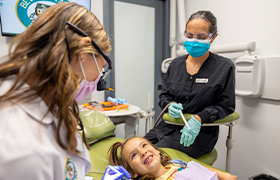Children’s Dentistry – Beverly, MA
Helping Younger Patients Achieve Healthy Smiles

As adults, we know the importance of good oral health, but what about our children? At Beverly Farms Dental, we believe in the importance of preventive care for even our youngest patients, which is why we offer children’s dentistry services. In fact, many of the adults we see are former child patients themselves. From the first visit, we pride ourselves on making all our clients feel welcome and comfortable. Our kid-friendly services make it possible for a dentist to ensure your child’s teeth and gums are developing correctly, and we take every measure to help prevent tooth decay and cavities. Call us today to schedule an appointment, and let our team of professionals put your child on a path to good oral health.
The Importance of Oral Health at an Early Age

The oral habits created during the first two years of a child’s life can determine whether tooth decay will develop or not. From diet, food intake, and oral hygiene, it’s important to be aware and practice positive oral habits at home. If your child develops cavities at an early age, it is more likely they’ll have problems with cavities once their permanent teeth come in.
This is why it’s crucial to set a good oral hygiene routine from the beginning. This ensures strong and healthy teeth development. As role models, parents are responsible for making sure children adhere to the routine and understand why good oral health is so important. Not only is it important that you direct your child to brush their teeth twice a day for two full minutes, but they should also floss at least once a day. Researching useful tips and tools can help you make this routine fun and enjoyable for your child.
Your Child’s First Visit

While the first dental appointment won’t require too much of your time, it is a great opportunity for your child to get to know the Beverly Farms Dental team. Going to the dentist can be a scary experience for some children, which is why bringing them in at an early age can help to alleviate those fears, and maybe even eliminate them altogether.
It is suggested that by the time your child’s first tooth pops through or they turn a year old, you schedule their first dentist appointment.
During the initial exam, one of our dental professionals, either Dr. Tsai or Dr. Tolzmann, will examine your child’s teeth for any signs of decay, as well as their gums, jaw, oral tissues, and their bite. Should there be any need, our hygienist will clean the teeth and determine if fluoride is necessary. Finally, you can expect to receive some helpful information about oral health basics for your child and what to expect regarding the development of their teeth.
Tips to Helping Your Child Practice Good Oral Hygiene

The key to a healthy mouth is regular brushing and flossing, but in order for this to happen, there are tips you can use to help your child practice good oral hygiene habits at home. These include:
- Choosing a toothbrush and toothpaste: Take your child to the drug store and let them pick out their own toothbrush and toothpaste. Oftentimes, companies incorporate cartoon or Disney characters onto their packaging. Look at it this way, if your child sees Batman on a toothbrush, it might make them more excited about brushing their teeth.
- Make It a Family Affair: If you’re worried that your child won’t brush and floss their teeth on their own, set up a time in the morning and evening to have the whole family engaged. By allowing your child to watch you practice good oral hygiene habits, they’ll most likely want to do the same. It will also make brushing and flossing more of an activity and not a chore.
- Turn on Some Music: Don’t be afraid to have a dance party while engaging in your oral hygiene routine. Using a small speaker or your phone, turn on some family-friendly dance music and watch as your child boogies along to the beat. You’ll be surprised by the memories you can make watching them brush and floss their teeth.
- Offer a Reward: Now this doesn’t mean sweets! Instead of food, offer your child a gold star or sticker each time they successfully complete their brushing and flossing routine. Children take to praise quite well, so making them feel special and rewarding them with a fun sticker can encourage them to continue this positive habit.
Children’s Dentistry FAQs

There’s nothing more important to you than making sure that your little one gets the dental care and treatment they deserve. Finding credible information about taking care of your child’s developing smile can be hard. With a trained and dedicated children’s dentist by your side like Dr. Tolzmann, you can trust that your little one’s smile will remain healthy and happy far into the future. For your convenience, we’ve compiled some of the most common questions we get from parents.
Are my child’s baby teeth important to their overall wellbeing?
Some people may believe that since baby teeth are destined to fall out eventually, that they’re not vital to children’s growth and development. We’re here to put this common misconception to rest. Those small teeth may be temporary, but they act as vital tools to help your child learn how to properly chew and speak at a vital developmental time in their life. Baby teeth also act as placeholders for their permanent teeth to grow in aligned and even. When they fall out too early, it can result in an increased chance of them needing orthodontic treatment later on.
Why is it important for my child to see the dentist when they’re young?
Getting your little one used to brushing their teeth and visiting the dentist when they’re young can make them less intimidated by the routine when they’re older. Many Americans have dental fears and phobias that manifested because of bad experiences when they were a child. When you take them to a good, fun, and educational children’s dentist that takes the time to engage with them, they’re sure to enjoy semi-annual checkups and cleanings as they get older!
Does my child need dental X-rays?
Because children’s mouths develop rapidly, they will need X-rays more frequently than adults in order to spot hidden problems that are invisible to the naked eye. The American Dental Association and American Academy of Pediatric Dentistry also recommend that children who are at a higher risk of developing cavities or dental disease should have X-rays professionally taken every six months to a year. These are usually bitewing X-rays.
What should I do if my child has a toothache?
Toothaches aren’t always serious problems; however, it’s a good idea to err on the safe side and take them to their children’s dentist whenever they feel any type of oral discomfort. Before you schedule an appointment, make sure their pain isn’t being caused by a piece of lodged food such as a popcorn kernel. You can do this by gently brushing and flossing their mouth to remove any debris. If their pain still persists, don’t hesitate to contact us so we can fit your little one in the same day, if necessary.
Should I be worried if my child sucks their thumb?
Thumb sucking is a completely natural coping mechanism that helps your child feel safe and secure. It doesn’t start impacting the development of their mouth until once their permanent teeth are starting to grow in. At this stage, the intense force caused by sucking on pacifiers or their thumb can cause them to develop bite problems, jutted out front teeth, or even orthodontic issues. You can avoid this by encouraging them to break the habit. If you’re not sure how to do this, don’t hesitate to ask Drs. Tsai or Tolzmann for recommendations or advice.

